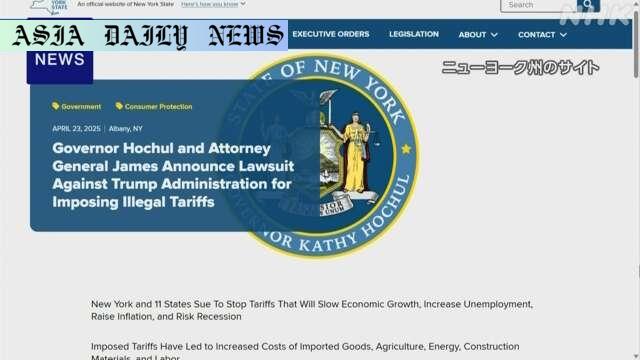Tariffs: A dozen US states, led by New York, sue President Trump’s administration, claiming the tariffs harm consumers by raising prices.
Tariffs: States allege Trump’s measures harm consumers and increase prices.
The lawsuit claims the tariffs violate constitutional authority.
States also say the tariffs have caused economic instability.

The Constitutional Debate Over Tariffs
The lawsuit filed by a coalition of 12 states against the Trump administration highlights a significant constitutional debate about the separation of powers within the US government. According to the suing states, the authority to impose tariffs is explicitly assigned by the Constitution to Congress. The Trump administration’s invocation of emergency powers to establish tariffs draws into question whether the economic circumstances cited meet the legal criteria of an emergency. By raising these issues, the coalition of states aims to reaffirm the role of Congress in fiscal matters, while challenging what they see as executive overreach by the former administration.
The Economic Impact of Tariffs on Consumers
The introduction of tariffs has led to significant economic ripple effects, not just within trading industries but also for ordinary American consumers. The states argue that the Trump administration’s actions led to an increase in consumer prices for goods subject to tariffs, creating what some have described as a hidden tax on the public. Additionally, industries that rely heavily on imported goods or raw materials have faced higher production costs, resulting in job losses and an overall slowdown in economic activity. This has further fueled concerns that the tariffs have destabilized the economy rather than achieving their intended goals.
Political Divide and Legal Implications
This case also underlines a sharp political divide, with Democratic-led states taking the lead in challenging the tariffs. The broader political debate surrounding this issue emphasizes ideological differences in economic and trade policies, with opponents accusing the Trump administration of recklessness and lack of foresight. The case, filed in the US Court of International Trade, could set a legal precedent regarding presidential authority in matters of trade and tariffs. If successful, the lawsuit could reshape how trade policies are implemented and prevent future administrations from bypassing Congress in similar matters.
The Broader Context and California’s Separate Action
In addition to the coalition’s lawsuit, California has independently filed a case against the tariffs. This concurrent legal action underscores the widespread opposition to Trump’s trade policies among states that have seen direct economic harm. While the main coalition has drawn national attention, California’s singular involvement may add weight to the overall effort to challenge the administration’s actions. Together, these lawsuits point to a more significant tension between federal and state governance in matters that directly affect local economies. The outcomes of these cases will be closely watched as they could influence US trade policies for years to come.
Commentary
The Underlying Issue of Tariffs and Governance
The lawsuit filed against the Trump administration by the coalition of 12 states raises important questions about the balance of powers within the US government. It is not merely about trade policies, but rather, it underscores the ongoing struggle over who holds the authority to make decisions that impact the nation’s economy irrevocably. The Constitution clearly grants Congress the power to lay and collect duties, but in this case, the former administration’s claim of emergency powers has created legal and ethical dilemmas. This is a fundamental test of the Constitution’s ability to safeguard democratic principles, particularly at a time when executive actions have increasingly dominated the political landscape.
Economic Consequences For the Ordinary Citizen
One of the critical criticisms against the tariffs is their direct impact on the American populace. The tariffs have incrementally raised the prices of many everyday goods, adversely affecting consumers, particularly those in lower-income brackets. Instead of serving as a protective economic measure, these tariffs have arguably become a financial burden for millions of people. Industries have also struggled to absorb the increased costs of imported materials, leaving many businesses in precarious situations. This has fueled a broader dialogue about the efficacy of such trade strategies and the long-term consequences for domestic economic stability.
The Litigation’s Potential Legacy
The outcome of this legal battle could have far-reaching consequences for federal governance and trade policy. If the court sides with the states, it could reignite debates about limiting executive power and reinforcing the constitutional role of Congress. Moreover, it may dissuade future administrations from unilaterally imposing trade measures without careful consideration of their broader implications. Regardless of the verdict, this lawsuit is a compelling reminder of the importance of checks and balances in ensuring accountable governance. The pursuit of fairness and legality in the face of questionable executive actions reflects a vital aspect of democracy that must be upheld.


